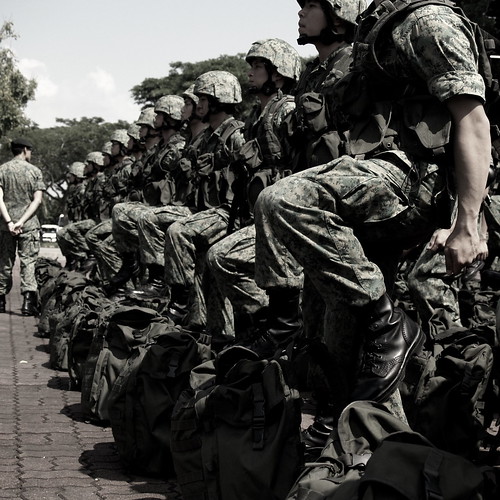30th Sunday in Ordinary Time (B)
(World Mission Sunday)
Readings: Jeremiah 31:7-9; Psalm 125(126); Hebrews 5:1-6; Mark 10:46-52
Picture: cc Richard Lee
My dear friends, do you know what hentak kaki means? For those who don’t, it’s a command in Malay, given to soldiers on parade, telling them to march on the spot. Which they are then expected to do, until they receive a further command, for example, to cepat jalan, to resume marching forward briskly. Anyone who has ever hentak kaki before, knows how tiring and frustrating it can be, especially under the hot sun. But this term is not just confined to the military. It’s also used at the workplace, to describe those who are repeatedly passed over for promotion. Like soldiers marching on the spot, such employees are also said to hentak kaki…
The frustration and fatigue, the sense of futility and even hopelessness that often results from remaining stuck in the same place, for a protracted period of time, despite making strenuous efforts to move ahead. This is also the experience of the people we meet in our readings today. In the first reading, the Word of God is addressed to the remnant of Israel, a people stuck in exile. God promises to comfort and care for them, to gather them and to guide them safely home.
Similarly, in the gospel, more than just being blind, Bartimaeus is also stuck by the side of the road. Thankfully, though his eyes are sightless, his faith enables him to recognise his Rescuer. At a word from Jesus, the stranded beggar receives not only his sight, but also his freedom. He is able to jump up, and to gratefully follow Jesus along the road. As a result, Bartimaeus becomes not only a disciple of Christ, but also an adopted child of God.
The proclamation of release to captives, of recovery of sight to the blind, and of freedom to the oppressed (Lk 4:18). This is the marvellous mission that Jesus carries out in our readings today. The mission given to the only begotten Son of God, who descends among us as high priest, appointed by God to set stranded people free. This is also what we recall especially today, on World Mission Sunday. Not our mission, but the mission of God, entrusted by the Father, to the Son, in the Holy Spirit. This is the mission from which we ourselves have benefitted, as Bartimaeus did. By virtue of our baptism into Christ, we too receive adoption as children of God, washed in the blood of the Lamb, and made partakers at his eucharistic Table.
More than any sense of obligation, it is deep gratitude for the mission entrusted by God to the Crucified and Risen Christ that then impels us to share the Good News of liberation with those who may remain stranded. As Pope Francis reminds us, to be ‘in a state of mission’ is a reflection of gratitude. It is in gratitude for gifts received that we, in our turn, accept and act on the command to become missionaries to those in need, especially in these trying times. People overwhelmed by fatigue and frustration, whether by the lack of work or by too much of it. People oppressed by a sense of futility, either because their options are too few or far too many...
Sisters and brothers, at a time when many remain stranded, how are we being commanded to cepat jalan today?


